- Home
- Alice Hoffman
The Museum of Extraordinary Things Page 9
The Museum of Extraordinary Things Read online
Page 9
“How is it possible that there’s no sign of her?” Weiss went on. “How many girls have hair so pale it’s the color of snow? How many come home every night right on time and are never late?” His voice was raspy. He had been searching through the debris on Greene Street and had breathed in cinders. “They found not a scrap of clothing, not her purse, not a bit of jewelry, nothing. She wore a gold locket that belonged to her mother. I gave it to her on her last birthday. She wept with tears of gratitude and swore she would never take it off. Gold does not burn, I know that much. It melts, but it doesn’t disappear. None of her friends saw her that morning. What do you think of that? I questioned everyone who survived, even her best friend, Rose, who’s still in St. Vincent’s Hospital, with both of her legs burned.” He glared at Eddie. “Don’t tell me nothing remains of a human being.”
Eddie went to the bureau for some whiskey and glasses. Before the fire he would have merely insisted his visitor leave, now he felt the thorn of compassion. He put down a glass in front of Weiss and asked, “Have you been to the precinct? Spoken with the police?”
“The police?” Weiss’s face furrowed with distrust. “No.” He gulped the whiskey and tapped his glass on the table for more. “I wanted someone I can trust. That’s why I came to you.”
“Me? Why would you trust me?”
Weiss shook his head, amazed by how dense the younger man was. “Because you are one of us, Ezekiel.”
“I’m not! Look at me.”
Eddie wore a blue shirt and black trousers. He had no tallit around his shoulders, a garment that showed a covenant with God, and no remnants of his Orthodox upbringing. His hair was cropped short, and he’d long ago forsaken the practice of wearing a skullcap. His large, pale feet were bare, allowing a glimpse of a tattoo of a trident he’d had inked on his ankle, a true embarrassment, even to him. He’d gone to the infamous Samuel O’Reilly’s shop one drunken evening, where the owner used Edison’s newly invented electric tattoo machine. Eddie had immediately regretted his choice when he awoke the next morning with a throbbing headache. Tattoos were strictly forbidden for his people, and men of his faith so marked could not be buried in a religious cemetery. Eddie’s regret, however, had less to do with faith than with the fact that the tattoo was so crudely drawn.
Weiss eyed the younger man sadly. “You think your father would send me to the wrong man? You think he doesn’t know his own son? You’re the one who can find people.”
“Mr. Weiss, please.” Eddie downed his whiskey and began a second glass. He wouldn’t mind getting drunk.
“He said you worked for Hochman.”
“He knew that?”
“A father knows his son.”
Eddie shook his head. “No.” He would get drunk, he had decided, without a doubt.
“He told me it was you, not that fake wizard, who discovered the boy under the bridge. The shyster took the credit, but you were the one who found him. Your father said you always had this talent. You guided him through the forest when you were a little boy. He said he would have been dead without you, or wandering there still.”
Eddie was stunned. He’d never thought he’d been the one to lead them out of the woods. And surely he’d never told his father how he earned his money. He knew that his father would have disapproved of Hochman and his methods. Now it seemed the elder Cohen had known precisely what Eddie was doing on the nights he’d sneaked out. He wondered if his father had lain in bed, eyes open, as Eddie let himself out the door. Perhaps he’d gone so far as to rise from the thin mattress, slip his coat over his pajamas, and track Eddie to the Hall of Love so he might stand in the dark on Sheriff Street and mourn what his son had become. Perhaps he’d had their suitcase in hand.
“You shouldn’t go around trusting people you don’t even know,” Eddie advised his visitor. “You’ll get into trouble that way.”
“I know your father, and that’s enough for me.” Weiss narrowed his eyes. “Do you want money? Because I have it.” The older man reached into the pocket of his overcoat, but Eddie stopped him.
“No. No money.” Eddie sat back in his chair and rubbed at his temples. His head was throbbing. “Even if I could do what you want, there’s no guarantee you would like what I found.”
Weiss shook his head, disagreeing. “If you find the truth, then you’ve found what I want.”
“What if Hannah is dead? You want to know that?”
“If she is, show me the locket. That’s when I’ll believe it. That’s when I’ll say the Kaddish and lay her to rest.”
Weiss reached for a photograph in his vest pocket. It was a poor example of the craft, snapped in one of those new ten-cent machines so popular at photo galleries at Coney Island and on Fourteenth Street. The image was already fading, turning milky, but the beauty of Weiss’s daughter was unmistakable. She had long, pale hair and delicate features.
“Your father said you would find her,” Weiss said, his voice seized by emotion. “Don’t make him into a liar.”
After Weiss’s visit, Eddie slept, awaking in the morning on the floor. He’d finished the whiskey after Weiss had gone, and added a good measure of gin, a lethal combination. Apparently he’d fallen asleep beside the dog. Now his back and legs ached. He had a cough and the room felt damp. If he wasn’t careful, he would find himself coming down with pneumonia, as Moses Levy had.
Eddie went to retrieve a tin box stowed beneath the floorboards. There was cash inside, his savings. He had hoped to buy a camera that would allow him to use flexible film, a new style in the art that made the development process faster and easier, but he could forgo such things. He’d gotten in the habit of hiding his earnings when he was a boy, choosing a clever spot, just beneath the table where he and his father took their meager supper each evening. In his loft he kept his savings in the same place. Eddie folded the bills into an envelope.
As he grabbed his coat to go out, Eddie spied a flash of silver light in the pail beside the sink, as if a star had fallen through the skylight. It was the trout, motionless at the bottom of the pail. He felt a rush of regret. He should have taken it back to the river, for a fish was born to be a fish, whether or not he’d been caught. He quickly folded the trout into a sheaf of newspaper, for he couldn’t leave it to stink, nor had he the heart to toss it into the trash pile in the alley. He whistled for Mitts and, with the wrapped fish resting in the crook of his arm, set out.
The liveryman had recently arrived to divvy out oats and hay. The stable tenant was a short individual, with broad ugly features, his face pocked with scars. Several of his teeth were capped with gold, and he often made reference to the fact that he’d given up his wild ways, not caring to elaborate further.
Sometimes the liveryman called himself Joe, sometimes it was Johnny. He started out as what was called a sheriff at various saloons, a bouncer who kept the peace while enjoying the violence of the job. At one time, he’d risen as high as a man could in the criminal world, working for Tammany Hall and the politicians who ran the city. But a long term in prison had taken his wildness out of him, and he’d sunk to working in the stable, renting out a carriage. He had a love of animals and birds, especially the pigeons he raised in the tack room, for they sat on his shoulders as he went about his chores. He’d begun his days in a pet store, and he often told Eddie he should have stayed with that. The horses ran to him now, and he treated them kindly, greeting each by name. Sally, Spot, Little Girl, Jackson. He lived round the corner, at a flophouse on Twenty-second Street where shared rooms could be had for the night, but should one of the horses take ill, he brought over his cot and slept in the stable. He could frequently be found smoking a foul mixture in the alley, bowls full of opium, but he never did so inside the stable, to ensure his creatures would be safe and no sparks would fall into the bales of hay. Eddie had chosen to ignore the stink of opium. In his opinion, there were far worse neighbors to have. There were thousand
s of men who visited the opium houses of the Lower East Side. Most of them couldn’t get a job, let alone keep one, but the liveryman managed well enough.
“You’re keeping early hours,” the fellow called as he tossed Mitts a biscuit. “Or is it that you never sleep?” He’d heard Eddie pacing at odd hours, seen him come in or leave when most men were safe
in bed.
Eddie grinned and stretched his aching back. “I slept on the floor like a dog.”
“Then you must have dreamed, for dogs do so nightly. Don’t let anyone tell you otherwise. Isn’t that right?” the carriage man said to Mitts, who had offered his paw before following his master out the heavy stable door.
Eddie loved the city when it was first waking. Energy surged through the concrete and cobblestones the way mist rises in the woods. In fact, his sleep had been deep and empty. If the liveryman was right and his dog dreamed, then Eddie envied him, for there had been no sign of the dark-haired woman who sometimes came to his bed in his dreams. Now Mitts trotted briskly along beside him on their journey downtown, clearly happy to be alive, with no thought to the future or the past. For this, Eddie envied Mitts as well, how light his burden was, how clear his purpose. He was to be his master’s companion, and in doing so he became himself, the essence of a dog. When all was said and done, it was conceivable that a being’s purpose remained the same throughout his life, and Eddie’s purpose was exactly what it had been when he was a boy, to pursue the light and find what was lost.
His destination was little more than twenty blocks downtown. He crouched on a stoop across from the building where he had lived with his father, pulling up his long legs, leaning against the ironwork railing. It was drizzling and the sky hung down. The gutters were wet and filthy. A boy came out of the house across the street. It was Eddie’s good luck that when he signaled the boy approached. He was six or seven years old, shy, Orthodox, hanging back when he reached the stoop. Clearly, he’d crossed the street because of his interest in the dog. He could barely take his eyes off Mitts, who cheerfully slobbered and returned the boy’s gaze.
“You know Joseph Cohen?” Eddie asked the child.
“No.” The boy most certainly had been told not to talk to strangers. He didn’t raise his eyes. To gain the boy’s trust, Eddie switched over to Yiddish.
“Mr. Cohen, the tailor. You know him?”
The boy glanced up, surprised that this lanky, gruff young man spoke his language. He didn’t look like one of them, but the boy accepted Eddie now that he knew they were of the same faith. It was obvious that the boy was more impressed by the dog than by anything Eddie had to say. He tentatively held out his hand, and Mitts sniffed it. Startled by the dog’s wet nose, the boy drew his hand back. He shifted from foot to foot, nervous but more interested than ever.
“Go ahead,” Eddie suggested, recognizing a fellow dog lover. “You can pet him. He won’t bite.”
The boy remained suspicious. It was likely that his mother had warned him not only to stay away from strange men but to avoid strange dogs as well.
“Go on,” Eddie said. “He’s friendly.”
The boy’s curiosity got the better of him. He edged nearer, grinning when Mitts sat before him.
“Someone I met said he’s a rabbit, and maybe that’s what he thinks he is. A big rabbit with white feet.”
When the boy petted the pit bull’s broad head, a smile of delight crossed his face. “He’s like silk.” Mitts licked his face, and the boy laughed and wiped his cheek. “He is a big rabbit.”
Eddie returned to his initial questioning. “You know the man who lives on the fifth floor? The tailor. The one that doesn’t like noise and doesn’t talk to anyone? He has a long, dark beard.”
The boy nodded, but he corrected Eddie. “His beard is gray.”
That piece of information made Eddie’s throat grow tight. He held out a dime. “For you,” he said, to the boy’s great surprise. He then handed the boy the envelope he’d brought along. “Bring this up to him and you can have the dime.” There wasn’t much cash in the envelope, but it was enough to purchase new boots, a few bags of potatoes and turnips, a scarf, even a new coat, for the one Eddie had bought his father long ago must certainly be threadbare by now. “Don’t open it. Understand?”
The boy accepted the dime and the envelope. Before he went on, Eddie grabbed him. “My dog can judge who’s trustworthy and who’s not, that’s why I’m giving this job to you. He trusts you.”
The boy nodded, his eyes on the dog. After Eddie let go of him, the young messenger patted Mitts one last time. “Good boy,” he said in English before he ran across the street.
The Cohen apartment was at the front of the building, its single window overlooking the street. Eddie had often sat there, watching the dusk sift past the glass, waiting for the time when he could sneak away. Now he wondered if his father had been aware each time he opened the door, just wide enough to make his escape.
After several minutes, Eddie looked up to see the curtains move. He lifted his hand to wave before the curtain closed. He had no idea if his father would keep the envelope that had been delivered, or if he would burn it in one of the two soup bowls he owned, or perhaps donate it to the poor box in the shul. Eddie wondered if he’d even recognized the man across the street as his only son.
Being back in the neighborhood gave Eddie the jitters, and his skin prickled. He considered stopping at the druggist’s shop on Grand Street where the pharmacist was said not to have left his store for more than twenty years, a self-imposed prisoner, the victim of love gone wrong. But the shop was often closed, and there was no cure for Eddie’s ailment. He wandered, so deep in thought he didn’t notice that the streets where he’d grown up had melted away. He found himself at the river. Water slapped at the row of wooden docks on stilts. He still had the trout, which he now unwrapped from its casing of damp newspaper. The silvery scales were cold and wet. The trout belonged to the river, and that was where Eddie would dispose of it. Rain had begun in earnest, a cold spring shower that left a haze of blue over the mirrored surface. Eddie could barely see New Jersey or make out the ferries that cut through the water. He leaned down, holding the trout in both hands. When he let go he expected it to sink. The rain was falling too hard to see clearly, yet he could spy a trail of light, as if the trout was racing through the water, headed for the depths, his freedom restored.
Eddie sat back on his heels, stunned. He did not believe in life everlasting, or in the prayers of his forefathers, or in miracles of any kind. The movement of the fish was most likely a trick of light, but light was something he did indeed believe in. He had the urge to leap in himself so that he might discover whether or not it was alive, and whether, if he followed the trout, he would find what he had lost when he left his father’s house, when he shut the door and found himself on the dark streets of New York.
THREE
* * *
THE DREAMER FROM THE DREAM
**********
FROM THE TIME I began my career at the museum, my father told me I was a wonder of the world. Yet when I held up my hand mirror to study my face, it did not seem wondrous to me. My features—gray eyes, black eyebrows, high cheekbones, pale complexion—added up to a plain person, a simple individual no one would look at twice. I considered myself to be nothing special, a dull creature who could not compare to those God had made to be unique in all the world, for the living wonders my father employed were as marvelous as they were strange. There were those who could eat fire, making sure to coat their throats before each performance with a thick syrup made in the Indies, and those with limbs so flexible they could flip upside down, standing on their hands for hours at a time. There was a girl not much older than I named Malia, whose arms resembled a butterfly’s wings. Her mother accompanied her to the museum every morning and made up her extraordinarily beautiful face with rouge and black kohl, so that her daughter resembled a monar
ch butterfly. I tried to befriend Malia, but she spoke only Portuguese, and my father did not wish for me to interact with those he employed. He handed me a book from his library and told me I would be better off befriending the works of Shakespeare.
Of all the living wonders, I was most curious about the Wolfman. He was so thoroughly covered with hair that when he crouched down he appeared to be an animal, albeit one who dressed in pleated trousers, a woolen overcoat, and handcrafted boots. He combed his hair neatly parted down his face so that his eyes might be seen. They were deep set and luminous, a rich brown color, so human it was impossible to judge him as anything other than a man once he gazed at you. The Wolfman’s name was Raymond Morris, and he came from a good family in Richmond, Virginia, who had kept him in the attic to protect him, and also to ensure there’d be no damage to the family’s reputation. He’d been hidden away from the time he was born.
Mr. Morris once confided in me that for most of his life he’d truly believed he had all he would ever need, despite being raised behind locked doors. There was a nursemaid to care for him, and later a manservant brought whatever he wished. He had fine clothes, and any food he desired, for a cook had been hired from Atlanta to see to his whims. As he grew older his greatest joy was reading. Because of this passion, his library surpassed those of many colleges. The life he led was enriched immeasurably by the many novels in his collection, all of which he had read more than once. Although he’d never felt the rain, he knew what it was like from his readings, just as he knew about the limitless sea, and the golden prairie, and the pleasures of love. He was convinced that his world was enough, he told me, until he read Jane Eyre. Then his opinion changed. He could feel the world shifting as he devoured the story. He suddenly understood how a person could go mad if locked away from all others, and he found himself half in love with the first Mrs. Rochester, the character other readers might consider the villainess of the book. He climbed out his window the same night he finished the novel. For the very first time he felt the rain splash against his skin.

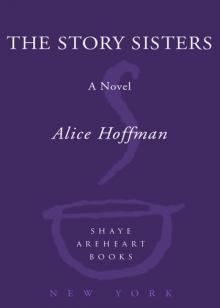 The Story Sisters
The Story Sisters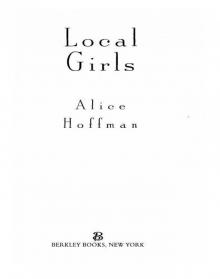 Local Girls
Local Girls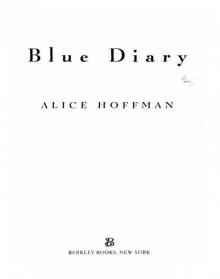 Blue Diary
Blue Diary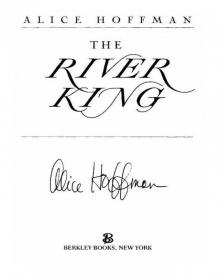 The River King
The River King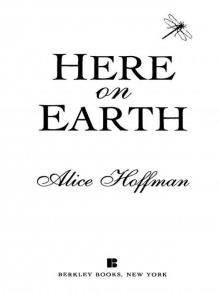 Here on Earth
Here on Earth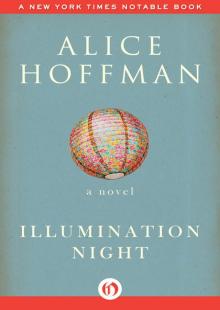 Illumination Night: A Novel
Illumination Night: A Novel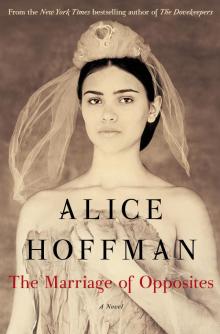 The Marriage of Opposites
The Marriage of Opposites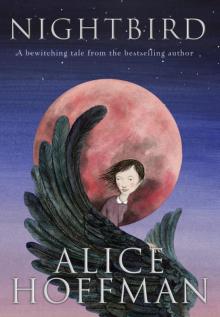 Nightbird
Nightbird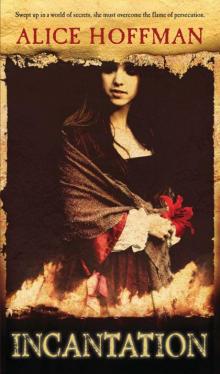 Incantation
Incantation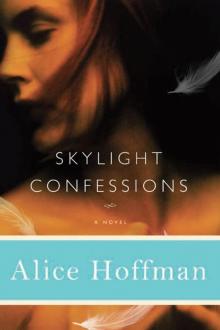 Skylight Confessions
Skylight Confessions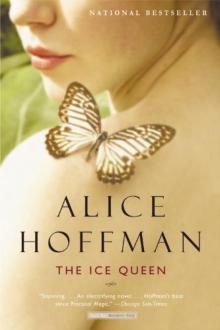 The Ice Queen
The Ice Queen Second Nature
Second Nature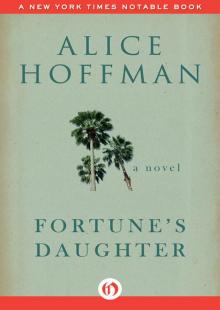 Fortune's Daughter: A Novel
Fortune's Daughter: A Novel Seventh Heaven
Seventh Heaven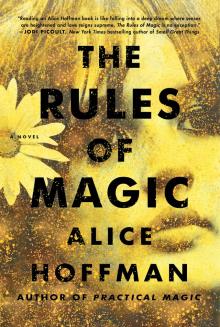 The Rules of Magic
The Rules of Magic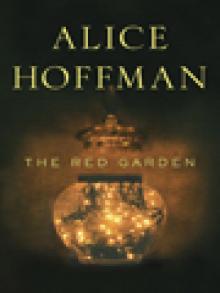 The Red Garden
The Red Garden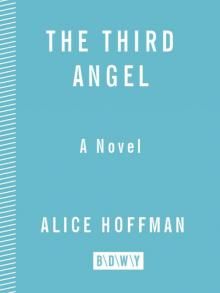 The Third Angel
The Third Angel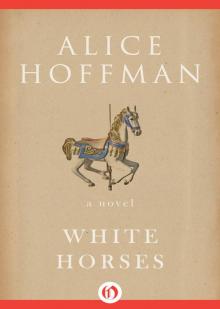 White Horses
White Horses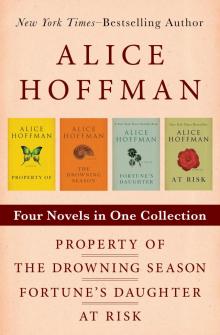 Property of / the Drowning Season / Fortune's Daughter / at Risk
Property of / the Drowning Season / Fortune's Daughter / at Risk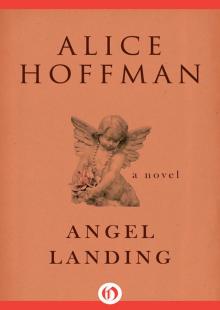 Angel Landing
Angel Landing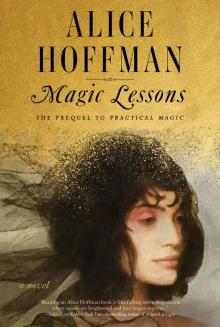 Magic Lessons
Magic Lessons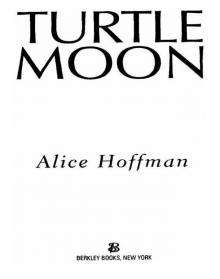 Turtle Moon
Turtle Moon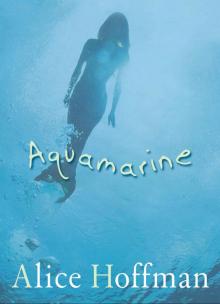 Aquamarine
Aquamarine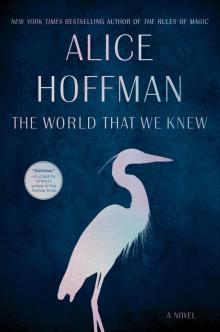 The World That We Knew
The World That We Knew Faithful
Faithful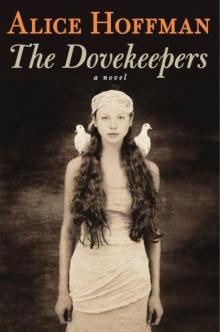 The Dovekeepers
The Dovekeepers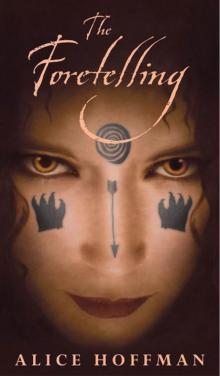 The Foretelling
The Foretelling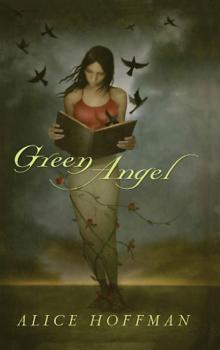 Green Angel
Green Angel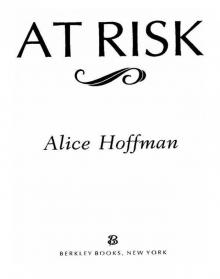 At Risk
At Risk Green Heart
Green Heart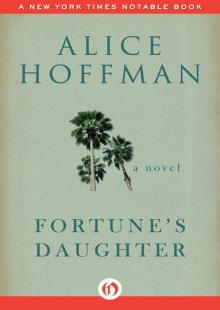 Fortune's Daughter
Fortune's Daughter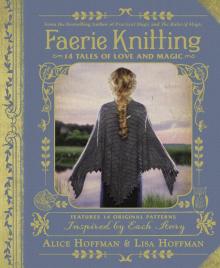 Faerie Knitting
Faerie Knitting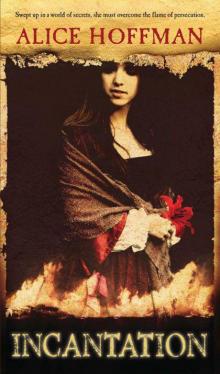 Incantation (v5)
Incantation (v5) Green Witch
Green Witch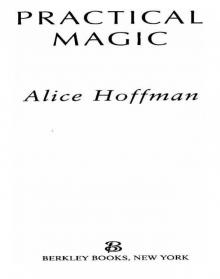 Practical Magic
Practical Magic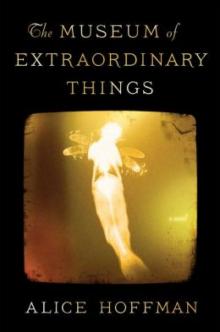 The Museum of Extraordinary Things
The Museum of Extraordinary Things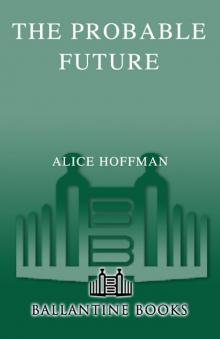 The Probable Future
The Probable Future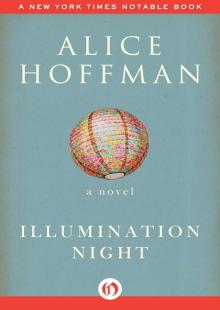 Illumination Night
Illumination Night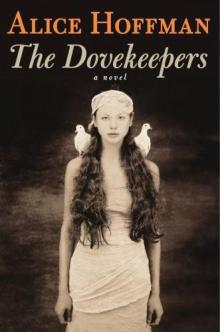 The Dovekeepers: A Novel
The Dovekeepers: A Novel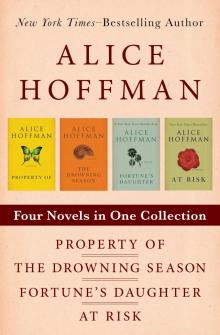 Property Of, the Drowning Season, Fortune's Daughter, and At Risk
Property Of, the Drowning Season, Fortune's Daughter, and At Risk